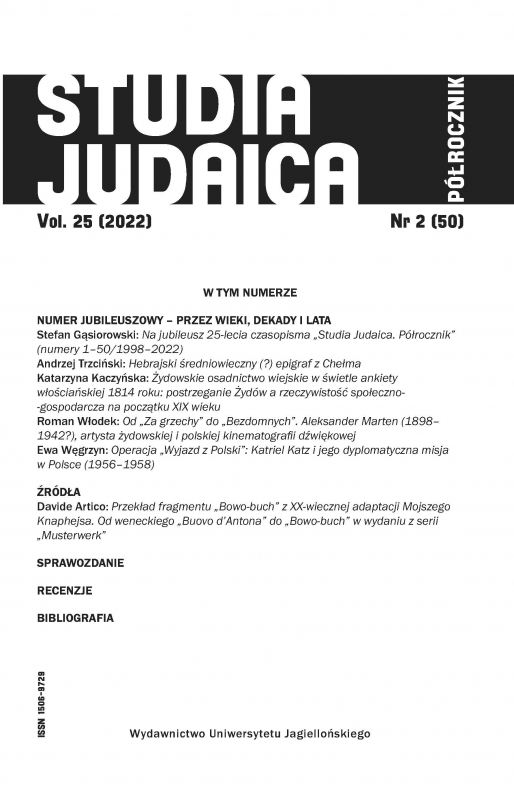Od Za grzechy do Bezdomnych. Aleksander Marten (1898–1942?), artysta żydowskiej i polskiej kinematografii dźwiękowej
From Al Khet (For the Sins) to On a Heym (Without a Home): Aleksander Marten (1898–1942?), a Filmmaker of Jewish and Polish Sound Cinematography
Author(s): Roman WłodekSubject(s): Fine Arts / Performing Arts, Jewish studies, History of Art
Published by: Wydawnictwo Uniwersytetu Jagiellońskiego
Keywords: Yiddish film; Aleksander Marten; Shaul Goskind; Kinor; Shimon Dzigan; Yisroel Schumacher
Summary/Abstract: Mordka Matys Tenenbaum (1898–1942?), also known as Aleksander Marten, is one of the least known Yiddish filmmakers. After ending his theatrical career in Germany and Austria, he went on to direct a Yiddish film Al khet (For the Sins) in Warsaw (1936). It was a melodramatic family story which brought him success and recognition both in Poland and in the diaspora, thus becoming the starting point of the so-called “golden age of Jewish cinema.” It was then that, among others, the following films were made: Yiddle with His Fiddle (Yidl mit’n fidl, dir. Joseph Green and Jan Nowina-Przybylski, 1936), The Handshake (Tkies kaf, dir. Henryk Szaro, 1937), The Dybbuk (Der Dibuk, dir. Michał Waszyński, 1937), and A Little Letter to Mother (A brivele der mamen, dir. Green and Leon Trystan, 1938). Marten, however, chose a different path. Following the example of filmmakers who worked both in Polish and Yiddish cinema, i.e., Szaro, Konrad Tom, Trystan, and Waszyński, the next year he decided to try his hand at Polish film, directing a sensational drama What Women Dream Of (O czym marzą kobiety). It bore a close resemblance, almost shot by shot, to the German film Was Frauen träumen (1933). In 1939, his other film Without a Home (On a heym) had its premiere. It was a drama about Jewish immigrants who struggled to adapt to new living conditions in America. It was also the last Yiddish film made in inter-war Poland.
Journal: Studia Judaica
- Issue Year: 25/2022
- Issue No: 50
- Page Range: 269-290
- Page Count: 22
- Language: Polish

